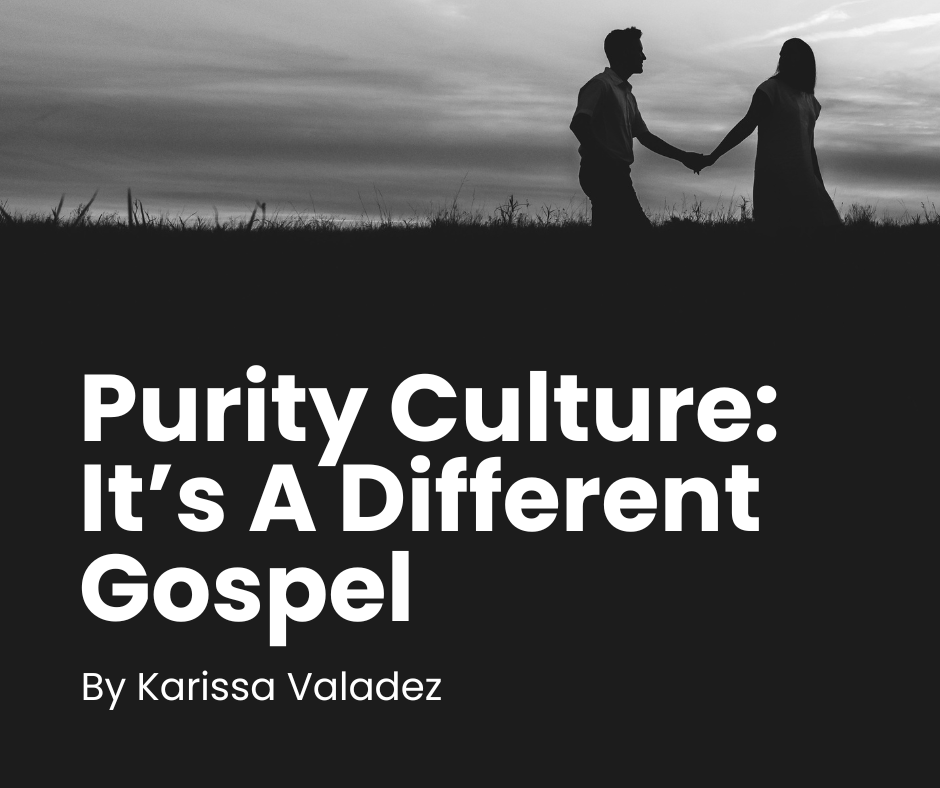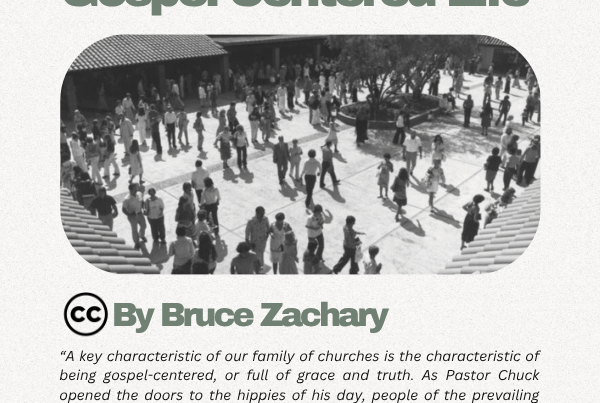
As an avid viewer of documentaries, and in particular those uncovering the inner workings of religious cults, I recently watched the Amazon Studios series Shiny Happy People: Duggar Family Secrets, a docuseries about the Duggar family and the Christian fundamentalist teachings of Bill Gothard. Personally, I found it to be very disconcerting.
You see, unlike the many other documentaries and series I’ve watched, Shiny Happy People hit a little too close to home for me.
I’d never heard of Bill Gothard before watching the show, yet I’m deeply familiar with his ideology. Throughout my teenage years in the church, I was influenced by many who parroted the teachings and values examined within this very docuseries.
I’ll never forget reading Joshua Harris’ book, Boy Meets Girl: Say Hello to Courtship, especially where he recalls the moment he sat across from Shannon, his future (now ex) wife and the subject of his courtship pursuit, as she tearfully confessed to him that she wasn’t a virgin. In that unnamed restaurant, Joshua Harris and his courtship partner wept together over this fact, and through tears, he forgave her.
When I read this as a impressionable teenager, it motivated a resolve in my heart: I would never put my future husband through such a painful ordeal. And I followed through with that promise. I checked every box for how a good Christian girl should wait. Yet, as an adult and mature Christian, when I consider that conversation described within the book, I now see that the entire exchange reveals the unhinged evangelical obsession with virginity, and he tying of women’s worth directly to it.
When Joshua’s future wife recalled and confessed her past in that moment, he could’ve recognized the beauty of Christ’s work in Shannon’s life. He could’ve rejoiced in the fact that Jesus had met her in her sin and brokeness, drew her to Himself, forgave and restored her, and exchanged her position in darkness and enmity with God for His righteousness—thus, making her a child of God. He could’ve written about how Jesus had sustained her and sanctified her over the years, producing the fruit of the Holy Spirit in her life, and instilling in her a character so remarkable that it was the first of her attributes that had caught his attention. He could’ve thanked God for what He’d done in and through Shannon, and for shaping her into the woman that sat before him…. Instead Joshua cried because she wasn’t a virgin.
In my opinion, the biggest detriment of purity culture is that by placing the emphasis on external works, we lose our focus on the person of Jesus Christ. The culture that’s built on shame and fear tends to lose its perspective of the magnitude of Christ’s power to redeem. He’s the same God who took a prostitute of Jericho and grafted her into the bloodline of the Messiah.
It should go without saying that all believers are equally called to holiness, but it seemed to me growing up in the church that the weight of purity fell to the female population more so than the male. I can only write from my own context, and in my surroundings Purity Culture reigned supreme; I know many other women whose experiences mirrored my own. So this article is aimed at addressing the ways in which many young women have been affected by growing up in church cultures that renounced the sexual objectification of women, while constantly defining the value of women and teenage girls by their ability to refrain from sexual activity—which is still objectification, by the way.
Works are a Poor Exchange for the Word
Before becoming a believer, it was the Word of God that softened my rebellious and hardened heart. It was the weekly teachings from Scripture that slowly lowered the walls I’d painstakingly built. For indeed, all scripture is God-breathed, living and effective, sharper than any two-edged sword, and able to cut between soul and spirit (2 Timothy 3:16; Hebrews 4:12).
Yet in the years that followed giving my life to Jesus, somewhere along the way, the emphasis of the discipleship and teaching that I received was placed more and more on my purity and commitment to wait for my future husband, rather than my knowledge of the Word and the pursuit of Jesus.
The books recommended to me were always about purity. The focus of the conferences that we attended were purity. Within youth group, the conversations and small groups for us girls inevitably centered around purity, marriage, and future husbands.
Somehow, the aim of discipleship in teaching the Bible believing Christian to pick up their cross and follow Jesus, to be a doer of the Word and not a hearer only, to go and make disciples of all nations, and to run the race with perseverance and with our eyes fixed on Him who has saved us, became secondary to the primary goal of getting young girls to stay virgins and make good wives.
But to be honest, I fully believe that this was done with the best of intentions. See, it’s good to pursue sexual purity. It’s good to be mindful of our actions and their consequences. It’s good to be intentional when it comes to such an important decision as a future spouse and life partner. These are valuable discussions to be had. The problem is when they become the most prioritized teachings.
At the end of the day, righteous living and the pursuit of holiness is the fruit of a believer’s spiritual life. It’s not a work that earns the doer special favors from God. Likewise, it’s not a determining factor for one’s value to God. Yet, that’s what it inadvertently became in many circles.
I realize that many of these messages were emphasized by well intentioned people who wanted only the best for the next generation. And for some, I believe they hoped to spare young girls from the same pain and sexual trauma they themselves had experienced. However, in an attempt to convey the importance of sexual purity, the conversations often turned to shame-based tactics and bribery.
The If/Then Clause of Purity Culture
“If you have sex before marriage, …”
then you’ll be like the tape that has lost its stickiness. Or the stick of gum that can’t be unchewed.
The piece of paper that’s been glued to another and ripped apart, never to be whole again.
The flower that’s been unpetaled … and so the list goes on.
But,
“if you wait until marriage, …”
then God will bless you. He will most certainly bring you a husband, healthy intimacy,
a wonderful marriage, and a family, all in His timing, just so long as you keep waiting.
The problem with this, aside from the fear mongering and unreliable promises, is that it’s an oversimplification and misrepresentation of the Christian life.
At its core, it’s a sex-based prosperity gospel.
And if we attempt to steer young girls and women towards living a life that pleases Christ with measures such as these, the outcome, while unintentional, can end up causing real harm:
Those who have fallen into sin may run from Christ feeling too ashamed to receive the grace and forgiveness that He offers because they’ve sat under the message that repeatedly emphasized that their worth is directly attached to their bodies, rather than the fact they are Image Bearers of the One who called them “friend.”
And for the “good girls” who’ve met every expectation when it comes to waiting, what happens when life doesn’t turn out to be the fairy tale that they’ve been promised it would be? When a husband doesn’t come and the years of singleness turn into disillusionment? Or say he does, and marriage actually turns out to be much harder than expected, and it fails to satisfy the longing of the soul that only Christ can fulfill.
If a young woman’s faith is built on the idea that she will receive blessings from God in exchange for what she does for Him, what happens when life inevitably presents challenges and heartache? When infertility leaves her with empty arms and a broken heart, or the betrayal of a husband’s porn addiction makes her question everything she knows, including the faithfulness of God?
If our discipleship for young women and girls within the church starts and ends with making sure that they stay sexually pure virgins, then we’re setting them up on a foundation of sand.
When it comes to instructing the singles and younger generation in the ways of righteous living, the sacrificial love that Jesus showed at the cross is more than sufficient cause for our obedience and desire for purity. We don’t need to add condemnation, make false promises … or place virginity on a pedestal as a prized commodity. We’re not Mormons, guys.
How Do We Represent the Heart of Jesus
As our western culture seems to lean more hedonistic with each passing day, the very notion of a God who maintains a standard for what His children do with their bodies is often perceived as archaic and oppressive. And this approach that “anything goes” has even made its way into some churches, perhaps as a backlash to the damage caused by purity culture.
So I hope you’ll not mistake my criticism of purity culture as an acceptance of sin or as advocacy for the belief that promiscuity equates to empowerment.
With my last article, I invited readers to consider being the change that they wish to see within the Church.
The world proclaims, “Do whatever feels good and makes you happy.” Meanwhile, the Church in many cases, has utilized unhealthy tactics at best, and at worst, shame, fear, and control in an attempt to promote purity.
What, then, should be our response to these two views that stand in opposition to one another?
Do we double down and start planning our church’s next “True Love Waits” event?
Or do we acquiesce to societal pressure to refrain from even mentioning the word purity, since it’s seen as a contentious and overbearing concept?
I propose that we look to the book of John.
The Price of Sin and the Kindness of Christ
John chapter eight starts with Jesus rising at dawn and going to the temple; there He begins to teach. The scribes and Pharisees interrupt His teaching by bringing a woman before Him, saying to Him, “Teacher, this woman was caught in the very act of committing adultery. In the law, Moses commanded us to stone such women. So what do you say?”
Of course, we know that this was a trap contrived by the religious order of the day in hopes that Jesus would incriminate Himself one way or another.
The woman in question was of no consequence to these Pharisees; the only value her life presented was that of a tool, as they attempted to outsmart Jesus.
This unidentified woman, caught up both in her own sin and in the political schemes of men, has found herself experiencing what was likely one of the most terrifying days of her life. What may have once been thrilling within the safety of secrecy, has now been exposed, leading to her public humiliation as she is dragged through the streets by rough hands and callous hearts, both ready to shed her blood.
Her husband, her family, her neighbors, the vendors from whom she buys her produce—everyone she knows—is now witness to her shame. But that’s not even the worst part; the worst is yet to come. According to Jewish law, a violent and terrible death awaits her.
I wonder if she wept when they thrust her before this man who they referred to as teacher. Or, did fear grip her entire mind and body instead, leaving her petrified and in shock? For me, as a woman reading the text, the panic and sickening dread that this scene produces is practically tangible.
Yet, when her captors present her before this man in the temple, He stoops low and begins to write on the ground. His entire demeanor, even down to His posture and position, de-escalates a situation fraught with tension.
We’ll never know on this side of heaven what exactly it was that He wrote in the sand that day, but His words that followed are recorded in verse seven: “… He that is without sin among you, let him be the first to throw a stone at her” (AMP).
With that, every man present was convicted by their conscience and began to leave, starting with oldest to the youngest. Once her accusers were gone and Jesus was all that remained, He stood up and asked, “Woman, where are they? Has no one condemned you?”
“‘No one,’ she answered.”
“‘Then,’ He said, ‘neither do I condemn you; go, and sin no more.’”
Our Response to What Christ Has Done
So what does John 8 have to do with courtship, virginity pledges, and everything else that has emerged from the purity culture movement?
Well, like the defenseless and adulterous woman, we too have been delivered from the judgment that our sin demands. So, as followers of Christ, our aim to walk in righteousness should be motivated by our love for the One who rescued us and stands in the gap between us and our accuser.
Our obedience is an act of worship, and true, pure living is the outpour of devotion to our savior.
You can’t formulate that, you can’t coerce it, and you can’t convey it in a ten-minute demonstration.
It comes through discipleship, leadership by example, empowerment through the Holy Spirit, and a strong foundation that’s built on the Word of God.
There’s nothing wrong with purity rings, books, and resources created to help people wait for marriage, until they become the source that we rely upon.
Church, let’s take seriously the equipping of women and young girls in the faith. Let’s stop taking shortcuts. Let’s see them as more than future wives and mothers, but as disciples of Jesus who require teaching and the knowledge of the Word so that they might hold fast to Jesus, regardless of whatever trials may come.
When Jesus rescued the adulterous woman, there was no shaming or condemnation found in His words. But He did charge her with this, “go and sin no more.”
It’s been made clear throughout Scripture that God’s priority for righteousness in our lives takes precedence over any sexual gratification. And the practice of death to self can’t be removed from the process of sanctification.
So as we exhort each other in pursuing purity, let it not be in fear and shame, in exchange for some idyllic future, or for the sake of a prospective husband … but because Jesus Christ loved us to such extent that He stretched out His arms on a cross and died the death that we deserve.
And He said “Be holy, for I am holy.”










